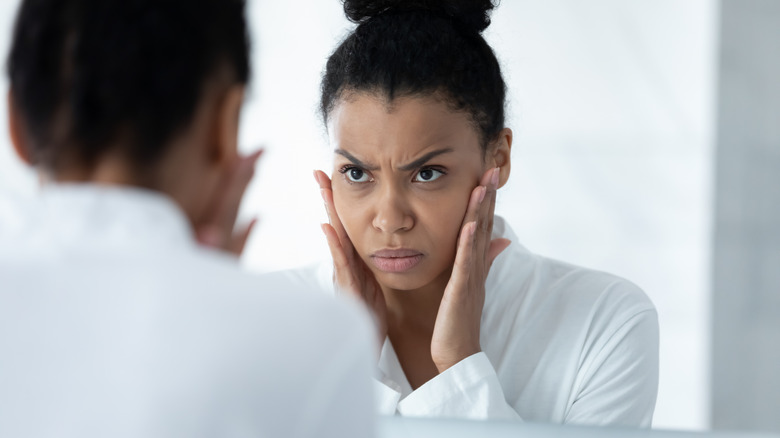Does Stress Cause Acne?
Our mental health feeds into our physical health. One example of this mind-body connection is the way in which stress takes a toll on the body. According to the American Psychological Association (APA), stress can impact our reproductive health, heart health, respiratory health, and nervous system, among many other areas of our bodies. In the long run, ongoing stress can increase one's risk of various health issues, some of which include migraines, hypertension, gut dysfunction, and immune disorders. Of the many areas of the body stress can affect, is our skin also one of these areas?
Acne develops when a buildup of natural oils and dead skin cells clogs our hair follicles (via Mayo Clinic). This is what leads to pimples, whiteheads, blackheads, red bumps, or solid painful lumps below the skin's surface. Often found on the chest or upper back, acne can also appear on the face, especially on the cheeks or forehead. In addition to natural oils, acne can also be caused by bacteria and inflammation. Can bouts of stress also kick acne into overdrive?
Stress and acne flare-ups
While stress does not cause acne, it can lead people who are already prone to it to experience a flare-up (via WebMD). Clinical professor of dermatology at the University of Texas Southwestern Medical Center Lisa A. Garner states, "When you already have acne and you get into a stressful situation, that seems to be when your acne really flares up."
Research published in Clinical, Cosmetic and Investigational Dermatology found through a study of 144 female students at King Abdulaziz University that acne severity was strongly linked to stress levels.
Experts at WebMD also explain that acne may be further worsened if people pick their skin in response to stress. However, due to the fact that stress is not the direct cause of acne, experts caution that stress management is not a cure for the skin condition. Instead, consult with a dermatologist who will be able to explore treatment options with you such as prescription antibiotics, retinoids, benzoyl peroxide, or hormonal treatments.


